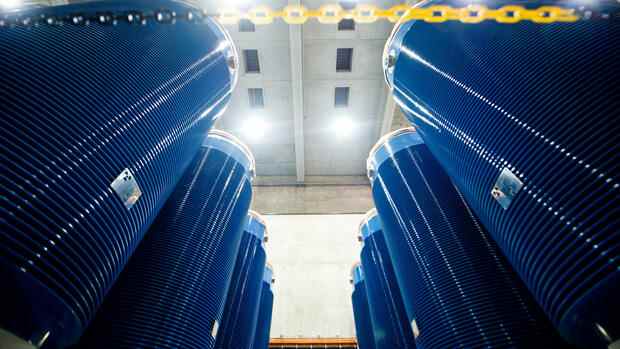Berlin For Guido Houben, the matter is clear: the radioactivity of nuclear waste could be “considerably reduced” by means of transmutation, difficult fission products such as iodine 129 or technetium 99 would be defused. Houben is one of the heads of the Swiss start-up Transmutex, which aims to apply the technology on an industrial scale as quickly as possible.
The term “transmutation” describes a conversion process in which one chemical element is changed into another chemical element. Concepts are being worked on worldwide to reduce the risk potential of radioactive waste through transmutation.
Transmutation is already working in the lab. Houbens is convinced that large-scale application is within reach. “We are working on completing the first accelerator-driven facility by 2032 at the latest. So it’s not about decades of further research work,” says Houben.
His company is already in the conception phase and is also in talks with German suppliers about setting up supply chains for series production. The first digital twin of a transmutation system will be presented in 2024, and the groundbreaking ceremony for the construction of a system could take place in 2028, according to Houben.
Top jobs of the day
Find the best jobs now and
be notified by email.
The transmutation makes nuclear waste “much easier to handle” and gives it a “more humane dimension,” says Houben. It is no longer about storing the waste for hundreds of thousands of years, but only for several hundred years.
The search for a repository could last until 2068
Houben is certain that this will open up completely new perspectives for the search for a repository for highly radioactive waste from German nuclear power plants. “The requirements that would have to be placed on a repository could be redefined,” says Houben. This is a great opportunity for politics and society. “Ultimately, this way we might even be able to settle the repository debate,” he added.
The requirements that would have to be made of a repository could be redefined. Guido Houben from the Swiss start-up Transmutex
The search for a repository is difficult in Germany. Only a few days ago it became known that it could drag on for decades. By 2031 it should actually be clarified where in Germany high-level radioactive waste is to be stored in the long term. But nothing will come of it, as the Federal Ministry for the Environment recently explained. In the meantime, there is talk that the process could drag on until 2068 in the worst case.
The question of whether transmutation can contribute to solving the repository problem is not undisputed. Many researchers are open to the technology, such as Dirk Bosbach, an expert in nuclear waste management at the Institute for Energy and Climate Research at Forschungszentrum Jülich.
Transmutation is a process “that should be kept in mind,” says Bosbach. “With the deep geological repository that Germany has decided on, one of the challenges is to safely enclose the highly radioactive waste for a period of one million years.” That is “undoubtedly not easy, but feasible”.
Long-lived radionuclides could be converted into short-lived ones by transmutation. “This could mean that the requirements to be placed on final disposal become less stringent,” he said.
For eternity
1
million years
That is how long high-level radioactive waste is to be locked away in the deep geological repository that Germany has opted for.
“Start-ups that deal with the topic are an asset. They proceed differently than classic research centers,” the scientist added. They could possibly help speed up certain developments. “However, I don’t think that we will see industrial solutions to the transmutation issue in the short term.”
Greens reject the technology, FDP is open
An analysis commissioned by the Federal Office for the Safety of Nuclear Waste Management (BASE) comes to the conclusion that the systems required for the transmutation are “not available on an industrial scale”. It is “not about technologies that are already operational today”.
In all likelihood, many more decades of research and development work will be required. From the point of view of the proponents, this statement should be questioned, since essential parts of the research work have already been done.
However, transmutation in Germany can only become an issue if politicians are involved. Houben from Transmutex agrees. “Of course we in Germany are largely dependent on how the political and social debate develops,” he says. Technology, financing and approval processes are “relatively foreseeable”. In the end, what matters is political will.
Scientific advances in nuclear technology have the potential to speed up and simplify the once-in-a-century task of final disposal. Michael Kruse, spokesman on energy policy for the FDP parliamentary group in the Bundestag
But the traffic light coalition is divided on this issue. The Greens reject the technology. Transmutation is “not an option to solve the nuclear waste problem,” says Stefan Wenzel, Parliamentary State Secretary in the Federal Ministry of Economics. “Some nuclides with shorter half-lives are faced with significantly larger amounts of waste with somewhat shorter half-lives. The task of the century, the search for a repository, would remain in place anyway,” Wenzel points out.
On the other hand, FDP politicians such as Michael Kruse, the energy policy spokesman for his parliamentary group in the Bundestag, are open to the technology: “Scientific progress in nuclear technology has the potential to accelerate and simplify the once-in-a-century task of final storage,” he says.
There are good chances to achieve success in the further utilization of the fission products by means of innovative technologies. “Transmutation is an interesting approach that should be researched with an open mind to technology and pursued with an open mind,” says Kruse.
More: Nuclear fuel rods from Tomsk – Europe’s incredible dependence on Russia
